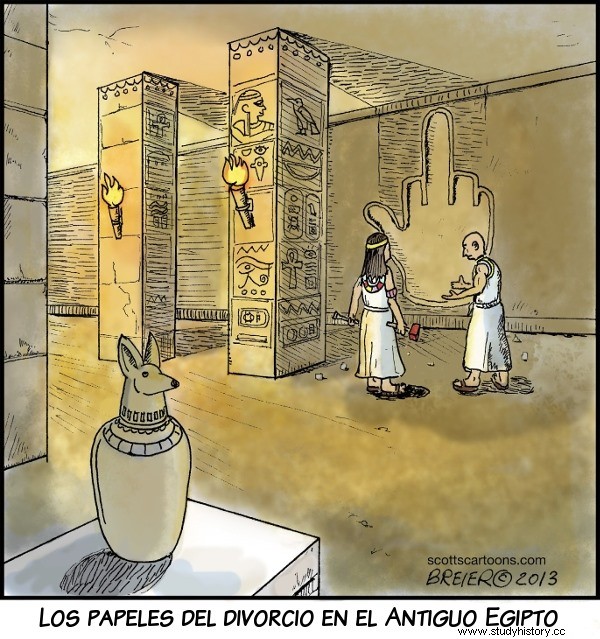In thousands of preserved papyri, it is surprising to note that the situation of women in the Greco-Roman period of Egypt was, in certain matters, much better than any other time before the 20th century. Although the women were not citizens and, with few exceptions, needed a guardian to represent them, some rights are mentioned that public and private documents confirm and expand.
The woman could inherit and testate, be the owner of territories and real estate, run a business... There is also a certain equality in marriage and divorce contracts. The marriage was not religious, but a simple cohabitation formalized by contract with termination clauses in case of divorce, restitution of the dowry and separation of property.

Marriage contract year 13 B.C. in Alexandria:
To Protarchus [president of the court], on behalf of Thermion, daughter of Apion, with her guardian Apollonius son of Cherea, and on behalf of Apollonius son of Ptolemy. Thermión and Apolonio agree to agree to share a life together; The aforementioned Apollonius acknowledges having received from Thermión by her house, as a dowry for her, a pair of gold earrings and (...) silver drachmas; and from this moment, Apollonius undertakes to provide Thermión as a married woman with everything necessary and clothes in accordance with her condition and not to mistreat her, not to expel her, not to insult her and not to put another woman, or, on the contrary, , he will immediately lose the dowry […] and Thermión undertakes to fulfill his duties towards her husband and those of life in common and not to be absent from home for a night or a day without the consent of Apollonius, and not to dishonor or damage the common house, and not walk with another man, or, otherwise, will be deprived of the dowry; and in addition the transgressing party will be subject to the prescribed fine.
Thus reads a divorce certificate from Alexandria in 13 B.C.:
To Protarchus, on behalf of Zois daughter of Heracliades, with her tutor, her brother Irenaeus, and on behalf of Antipater son of Zeno. Zois and Antipater agree to separate from each other breaking the union that was established by contract before this same court [...] Zois acknowledges having received from his house what he obtained as a dowry:dresses worth 120 silver drachmas and a pair of gold earrings. Therefore, from now on the marriage contract is annulled and neither Zois nor anyone in her name can contend against Antipater to require the restitution of her dowry; nor either party against the other on the point of cohabitation or any other matter to date; date from which it is lawful for Zois to marry another man and Antipater with another woman, without either of them being denounced for that reason.
